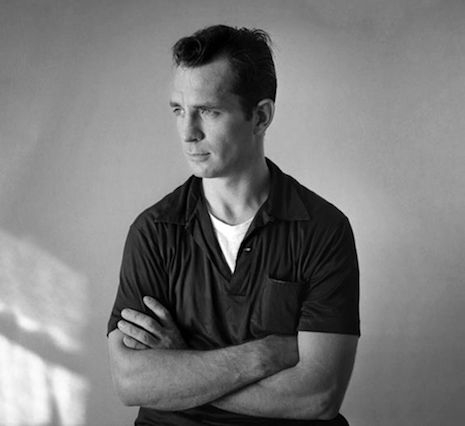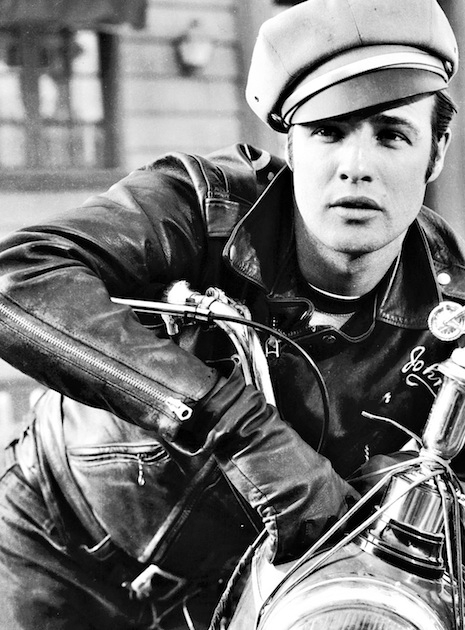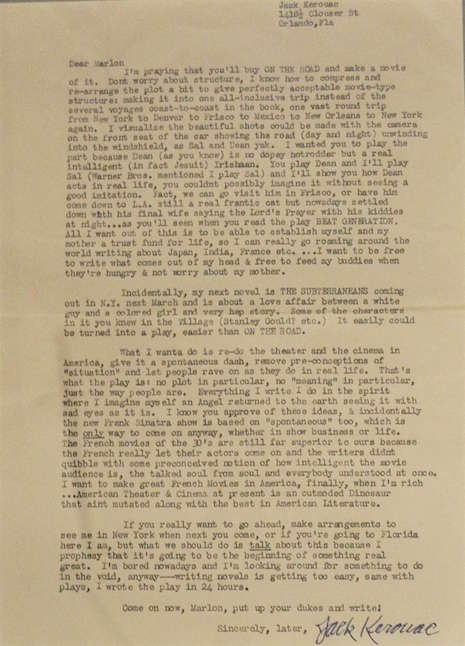
It’s fair to say most writers would like a movie made of their books—it’s a way of reaching a far greater audience and pegging a stake on fame, fortune and celluloid immortality. To this end, some writers often dream up a cast list of their favorite actors who they think are best suited to play the fictional characters they’ve created. Though of course this rarely happens as box office clout always beats artistic sensibilities when it comes to casting.
In September 1957, Jack Kerouac’s novel On the Road was published to great and immediate acclaim. Film studios clamored to option the book. Warner Brothers expressed an interest as did Paramount, but Kerouac had his own ideas.
The Beat author wanted Marlon Brando to make a movie of On the Road. He thought Method actor Brando was perfect for the central role of Dean Moriarty. Kerouac was ambitious enough to consider himself for the role of his fictional alter ego and Moriarty’s sidekick Sal Paradise. Brando was a hot property. He was considered perhaps the greatest actor of his generation and had been nominated five times for an Academy Award—winning one for his performance in On the Waterfront in 1954. It was a big ask, but Kerouac was hopeful.
“Dear Marlon,” his letter began:
I’m praying that you’ll buy ON THE ROAD and make a movie of it. Don’t worry about the structure, I know to compress and re-arrange the plot a bit to give a perfectly acceptable movie-type structure: making it into one all-inclusive trip instead of the several voyages coast-to-coast in the book, one vast round trip from New York to Denver to Frisco to Mexico to New Orleans to New York again. I visualize the beautiful shots could be made with the camera on the front seat of the car showing the road (day and night) unwinding into the windshield, as Sal and Dean yak. I wanted you to play the part because Dean (as you know) is no dopey hotrodder but a real intelligent (in fact Jesuit) Irishman. You play Dean and I’ll play Sal (Warner Bros. mentioned I play Sal) and I’ll show you how Dean acts in real life, you couldn’t possibly imagine it without seeing a good imitation. Fact, we can go visit him in Frisco, or have him come down to L.A. still a real frantic cat but nowadays settled down with his final wife saying the Lord’s Prayer with his kiddies at night… as you’ll see when you read the play BEAT GENERATION. All I want out of this is to be able to establish myself and by mother a trust fund for life, so I can really go roaming around the world writing about Japan, India, France etc… I Want to be free to write what comes out of my head & free to feed my buddies when they’re hungry & not worry about my mother.
Incidentally, my next novel is THE SUBTERRANEANS coming out in N.Y. next March and is about a love affair between a white guy and a colored girl and is a very hep story. Some of the characters in it you know in the Village (Stanley Gould etc.) It easily could be turned into a play, easier than ON THE ROAD.
What I wanta do is re-do the theater and the cinema in America, give it a spontaneous dash, remove pre-conceptions of “situation” and let people rave on as they do in real life. That’s what the play is: no plot in particular, no “meaning” in particular, just the way people are. Everything I write I do in the spirit where I imagine myself an Angel returned to the earth seeing it with sad eyes as it is. I know you approve of these ideas, & incidentally the new Frank Sinatra show is based on “spontaneous” too, which is the only way to come on anyway, whether in business or life. The French movies of the 30’s are still far superior to ours because the French really let their actors come on and the writers didn’t quibble with some preconceived notion of how intelligent the movie audience is, they talked soul from soul and everybody understood at once. I want to make great French Movies in America, finally, when I’m rich… American theater & Cinema at present is an outmoded dinosaur that ain’t mutated along with the best in American Literature.
If you really want to go ahead, make arrangements to see me in New York when next you come, or if you’re going to FLorida here I am, but what we should do is talk about this because I prophesy that it’s going to be the beginning of something real great. I’m bored nowadays and I’m looking around for something to do in the world, anyway — writing novels is getting too easy, same with plays, I wrote the play in 24 hours.
Come on now, Marlon, put up your dukes and write!
Sincerely, later, Jack Kerouac

This letter was only discovered after Brando died in July 2004. Helen Hall was tasked by auction house Christie’s to visit the actor’s home on Mulholland Drive in Los Angeles and select property to include in an auction of his estate.
Hall spent around ten days at Brando’s house sifting through his personal effects “with a fine tooth comb.” The most valuable thing she had found was an annotated copy of Brando’s script for The Godfather tucked away with all his other movie memorabilia in a bunker in the garden. Hall thought this was the best she would find. On her tenth day at the house, Hall and her team searched through the very last room on their list—Brando’s office:
Along one wall was a bank of filing cabinets. We started to pull drawers out, finding old insurance documents, receipts for work done on his pool, that sort of thing. My heart was heavy as we sifted through more of the same.
And then, tucked inside a file of unexciting correspondence, was a letter that appeared to be much older than everything else. I pulled it out, trying not to get excited, but there it was, a typed letter signed at the bottom in bold blue ink, “Jack Kerouac.” I nearly fainted. As I read the letter, it became clear that it must date from at least the late 1950s.
The letter was a gem. Here’s part of what Kerouac wrote: “I’m praying that you’ll buy ON THE ROAD and make a movie of it…. I visualize the beautiful shots could be made with the camera on the front seat of the car showing the road (day and night) unwinding into the windshield, as Sal and Dean yak…. You play Dean and I’ll play Sal.” Brilliant! I had found a one-of-a-kind letter between two of the 20th century’s most important and influential icons. The letter ending up bringing $33,600 at the auction, but my memory of finding it on that hot California day is priceless.
Brando never replied to Kerouac’s letter—but he must have thought sufficiently of Kerouac to keep it filed away amongst his personal papers. Kerouac also sent Brando a copy of his play The Beat Generation, which the actor also (sadly) ignored.
